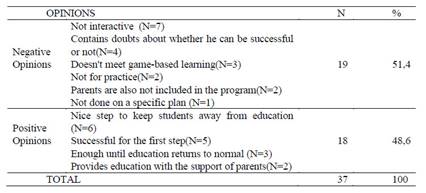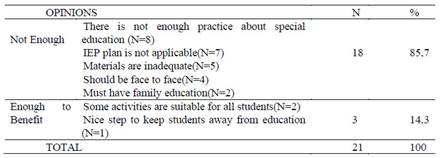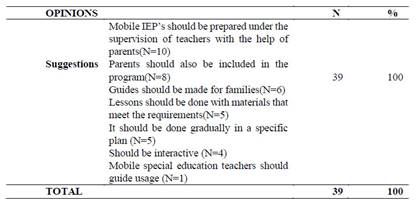Introducción
The epidemic affecting every sector in Northern Cyprus has brought educational activities to stop. As of March 10, the first day of the epidemic, education has stopped in all primary education institutions in the country. In this formation, the first level of education is the primary education department and includes preschool, primary school and special education (TRNC MNE).After the emergence of the epidemic, although the Ministry of National Education has taken some precautions to prevent course losses, it has also made some radical decisions at primary level and started distance education applications with the support of volunteer teachers. Although there is no open education practices policy in education system, all levels of education turn attention to catch remote learning potential. However, there is no local action plan for that, all institutions even individual level teachers look for strategies to give better recovery mode of action for lose classes. Most preferably, zoom become the alternative platform to propose interaction between learners and teachers, even this program fosters meeting between colleagues and enrich collegiality (Huang, et al, 2020). As this study stances Carpe Diem model of Gilly Salmon which challenge collaboration and planned course of action, study shows the importance of local action plan for region and specific action plan for those who have special needs. Giving learning and teaching opportunity to those learners is not enough, also family education needs to be supported during the pandemic. Therefore, leadership and the right choice of enabling technology during pandemic time are crucial. What teachers have done as being proactive in this period is to find possible solution to communicate and reach out students. Using the "zoom" program for these distance education applications, teachers prepared presentations on the computer, and the students with the appropriate conditions and environments started to watch the applications appropriate for their age levels and then started to solve questions about the subjects. Individuals who need special education should be trained differently from their peers for various reasons, in accordance with their developmental characteristics (Eurybase, 2009: Altınay, Altınay, Dagli and Altınay, 2018). As learning facilitatation is different in special education, in this epidemic process, distance learning can be considered as an alternative for students whose development levels continue regularly depending on the age group. However, for students with special needs who have different levels of development than normal; the training to be delivered should also be special (Çelikten, 2018). Distance education is an opportunity to support learning of special needs students if the accessible technologies and information was provided. Special education practices gain importance in these students. Special education; is the education given to students who are different and special from their peers in terms of their developmental characteristics. In this research based on this point; it is aimed to answer the questions of what is done in distance education and how students can benefit from this distance education, so that special education students in primary education can continue their education during the epidemic process (Zhang, et al., 2020).
Method
The research used interview technique, which is one of the qualitative research methods. The interview technique has an important place in qualitative research and is frequently used to reveal the data, opinions, experiences and feelings of individuals and is based on speech (Yıldırım and Şimşek, 2013). The sample of the research consists of 10 special education teachers working in public primary schools affiliated to the TRNC Ministry of Education and Culture in the 2019- 2020 academic years. The sample created is compatible with the "purposeful sampling" approach. Purposeful sampling can be defined as an in-depth study of situations that are supposed to yield rich data (Yıldırım and Şimşek, 2013). The teachers selected in the research in accordance with the purposeful sampling are the people who are easily accessible by the researchers during the epidemic and are suitable for the "easily accessible case sampling". In this research, volunteer teachers who have practiced distance education in this period was chosen sample. As the country has not immediate action plan for those students during pandemic time, there are only few teachers voluntarily propose action individual level. Therefore, only ten teachers take part of this research scope with their volunteer proactive attempts for their students. Furthermore, as the country has limited numbers of special education teachers, limited volunteer teachers supported the distance education practices of Ministry of Education. This limited numbers of teacher experiences’ were examined in this research. Their first experiences were valuable to future education trends in special education in relation to distance education. Students who needs special education are not identified because those students study in the same conditions who has various different disabilities. This issue is the local problem of country to set identification and provide class or school for those students with potential technology and teachers who have distinctive specialisation. In the research, "semi-structured interview" technique was used as data collection method. In this technique, the researchers prepare the interview form that includes the questions that is planned to ask in advance. Depending on the flow of the interview, it can affect the flow of the interview with different side or sub-questions, and enable the person to open and elaborate his answers (Türnüklü, 2000). Interview questions prepared by the researchers; aimed to include the concepts of "covid-19 outbreak, education, special education, distance education". To ensure the internal validity of the interview questions; questions were shown to three field experts, two of whom are experts in the field of education management and one of whom is specialized in Turkish Language. Then, pilot implementation of the questions was made with two special education teachers and thus, the interview questions were finalized. This research can be reached during the pandemic period and is applied with 10 special education teachers working in primary education institutions; each 35-40 min. is limited to ongoing negotiations
Results
Findings obtained from special education teachers in the research and comments on the findings are as follows:
Table 1 General opinions of special education teachers about distance education applied during the epidemic period

In Table-1, general opinions of special education teachers about distance education activities implemented by MNE during the epidemic period are given. As can be seen from here, the positive (51.4%) and negative (48.6%) opinions of teachers are very close to each other. In negative views, teachers state that the system is not interactive most (N=7); in positive opinions, it was stated that this practice ensures that students are not disconnected from education (N=6). The following examples can be given regarding the opinions obtained from the teachers:
"Students are not able to ask their teachers questions about the issues they have in mind whenever they want." (T-1/negative), "I am hesitant about whether it will be successful because it is so new. We will see this over time." (T-5/negative), "Students in primary education need game-based learning due to their developmental characteristics and distance education is not suitable for meeting this need." (T-8/negative), "The distance education provided is not practical." (T-2/negative)
"In order to continue distance education in primary education, parents must be included in the programs." (T-5/negative), "Distance education applications are not carried out in a planned manner. There are differences according to the curriculum." (T-7/negative).
"It is a positive and good step to keep students away from education during the epidemic." (T-3/positive), "Although a distance education process has been initiated to be developed, I can say that I found it successful for the first step."(T-10/positive), "A practice that is sufficient and will not take them off from education until the time when children will start studying in schools again." (T-4/positive), "Parents' support is required for students to keep up with the system and this contributes to the participation of parents in education." (T-6/positive).
Table 2 Opinions of special education teachers on the use of special education students from distance education

The views of special education teachers on the ability of students with special education need to benefit from distance education applications are given in table-2. The vast majority (85.7%) of the teachers stated that special education students could not benefit from distance education sufficiently and stated that there is not enough application about students who need special education (N=8). A small number of special education teachers (14.3%) stated that some activities uploaded to the distance education system are suitable for all students and students who need special education can benefit from these activities (N=2). Expressions of special education teachers on the subject are as follows:
"There are not enough applications that special education students can use." (T-5/ negative), "Considering the "Individual Education Plan (IEP)" applied to special education students, it does not seem possible for special education students to be successful in distance education applications at this stage." (T-1/negative), "Trainings should be prepared with special materials in accordance with the individual needs of special education students." (T-5/negative), "Students who require special education should face their education. In this sense, distance education is not suitable for students with special education needs." (T-8/negative), "In order for distance education applications to be effective for special education students, family participation should be provided and families should be educated so that children can help." (T-4/negative)
"Some of the students who require special education find and benefit from the lesson activities prepared for other students that are suitable for their courses." (T-9/positive), "It is good that there are some applications for special education students, like other students, to prevent them from leaving the educational environment." (T-2/positive)
Table 3 Suggestions of special education teachers on how special education students can benefit from distance education

Finally, he asked the special education teachers about the suggestions on how to enable special education students to benefit from distance education. Special education teachers made 39 suggestions on the subject. Among these recommendations, the most frequently repeated suggestion is "While preparing mobile IEPs under the supervision of teachers with the help of parents" (N=10); the least said suggestion is that "mobile special education teachers should guide usage" (N=1). Expressions of special education teachers on the subject are as follows:
"A digital platform will be created to reach visual and mobile applications to be prepared in the current situation, and IEPs should be prepared under the guidance of teachers, with the help of parents in digital environment." (T-1), "Instead of just explaining the education program prepared for the students to the student, the education process of the student should be continued by applying the parents through the parent, by including the parents of the student in the education process." (T-5), "Guidelines for special education families should be prepared and families should be trained on how to benefit their children from distance education." (T-8), "Lessons should be taught in some way, using materials that are tailored to the specific needs of students." (T-10), "Distance education applications that will be prepared for special education should be carried out on a specific plan." (T-6), "The remote education applications to be prepared must be interactive using programs such as "zoom" and feedback must be obtained from students immediately." (T- 9), "In order to ensure the spread of distance education applications in special education, mobile special education teachers should be trained and educate families and students about distance education." (T-3)
Discussion
In this research teachers’ opinions and experiences give direction of necessity in enabling technology for those students not only pandemic time. Because of not having proper identification on students disabilities and not having enough specialists on various disabilities, technology may become path for increasing potential on learning of students and supporting families through counselling and guidance. Findings from experiences of teachers showed positive and negative reflection on practice. Similarly; Golladay et al. (2000) mentioned that there is a lack of face-to- face communication in distance education applications; it is important place in transferring education to individuals who cannot receive education in schools. When teachers are asked to evaluate the usefulness of distance education applications in primary education for children who need special education; they mentioned that there is not enough distance education practice for students with special educational needs, the fact that IEP is not applied in distance education for students with different developmental features, the use of materials suitable for students' needs is insufficient, and it is not possible to provide face-to-face education with distance education and family education is not given importance.
Chao et al. (2006) expressed that the richness of learning and teaching materials affect the quality of distance education; on the other hand, McLean (2006), talked about the importance of direct feedback in online learning environments. The positive statements about the subject are that some of the applications prepared for elementary school students in distance education may also be suitable for special education students, and that distance education applications are important in the epidemic period in order to ensure that special education students do not withdraw from education as their peers (Özdilekler, Altınay, Altınay, & Dagli,2018).
Conclusion and Suggestions
In conclusion, the vast majority of the participants stated that special education students were not able to benefit from distance education sufficiently and stated that there are not enough applications for students who need special education. Few special education teachers stated that some activities uploaded on the distance education system are suitable for all students and students who need special education can benefit from these activities. There is accessibility problems on practices which this problem is local problem of country for learners with disability. During this period it is seen that teachers need support of families to continue their educational practices. It is revealed that family education plays a great role in facilitating education for special education. In this respect, this research; showed that the distance education applications carried out by MNE during the covid epidemic period did not meet the needs of students with special educational needs and proactive plans did not cover family education policies. Based on the results of the research, the following recommendations have been developed for MNE:-It is necessary to prepare IEP online. Appropriate teaching methods and materials should be selected to be used in these practices and take into account special situations, family support is the part of special education, therefore it should be included to online special education policies.















